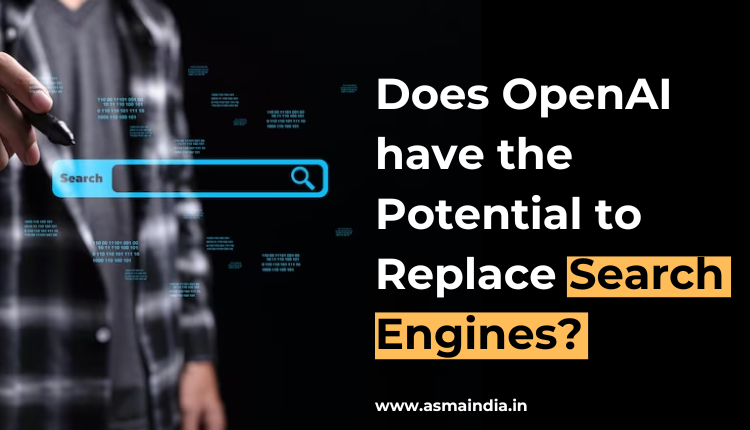Does OpenAI have the Potential to Replace Search Engines?
OpenAI is a leading AI research organization that has developed several state-of-the-art AI models, including ChatGPT. However, there are several other organizations and companies that are developing similar AI models and technology. Similarly, if we talk about the google search engines which is purely based on the key word’s algorithm, crawling information from the web. The search has certain limitation in terms of serving information based on keyword and deliver what is the most probable information in regards to search made.
There are several other AI models in the market and they are keeping their value pace at par with the OpenAI ChatGPT
- Google AI: Google’s AI research division has developed several advanced AI models, including the language model BERT, which has been widely adopted in natural language processing tasks.
- Facebook AI: Facebook has a large AI research division that has developed a number of cutting-edge AI models, including the language model RoBERTa, which has achieved state-of-the-art results on several NLP benchmarks.
- Microsoft Research: Microsoft’s research division has developed a number of AI models and technologies, including the language model ERNIE, which has been applied in a variety of NLP tasks.
- Amazon AI: Amazon has a large AI division that has developed several AI models and technologies, including the personal assistant Alexa, which uses natural language processing to engage with users.
- Huawei AI: Huawei’s AI division has developed a number of AI models and technologies, including the language model MinWA, which has been applied in a variety of NLP tasks.
These are just a few examples of the many organizations and companies working on advanced AI models and technologies. The field of AI is rapidly evolving, and there are many exciting developments and breakthroughs happening all the time.
Google Search Engine and ChatGPT
Google search engine and ChatGPT are both tools for finding information, but they have some key differences:
If we look at the scope as a parameter then Google search engine is a tool for finding information on the internet, while ChatGPT is a conversational AI model that can answer questions and provide information on a wide range of topics, from general knowledge to specific technical details. Similarly, Google search engine provides results based on keyword matching and algorithms that rank the relevance of websites, while ChatGPT uses its language understanding to determine the most appropriate answer based on the context of the question.
Apart from scope and interaction, relevancy is another parameter since one is solving the query of user and another is just trying to interact with the user like Google search engine is a passive tool that provides information based on the user’s query, while ChatGPT is designed to have a conversation with the user, allowing for a more dynamic and interactive experience.
Similarly, in today’s 5G environment, where speed is the paramount, we see that google search engine usually works faster than ChatGPT in terms of providing a large number of results, but ChatGPT can provide a more detailed and specific answer in real-time.
What about Google AI
Google AI and ChatGPT are both advanced AI models developed by leading technology companies, but they have some differences.
Google AI is a research division of Google that develops a range of AI models and technologies. One of its most famous models is BERT, which is a transformer-based language model that has been widely adopted in NLP tasks and has achieved state-of-the-art results on a number of benchmarks.
ChatGPT, on the other hand, is a specific language model developed by OpenAI. It is based on the transformer architecture and has been trained on vast amounts of text data, making it capable of generating human-like responses to a wide variety of questions and prompts.
In terms of capabilities, both Google AI and ChatGPT are advanced AI models that are capable of generating human-like text, but there are some differences in their approach and specific capabilities. For example, BERT is specifically designed for NLP tasks, while ChatGPT is more broadly applicable across a range of AI applications, including chatbots, content generation, and more. ChatGPT has also certain limitation in terms of cutting off from 2021 onwards, since the version had stored the information till 2021, thus it doesn’t have any idea about new development that’s going around the world.
Ultimately, both Google AI and ChatGPT are examples of the cutting-edge AI technology being developed by leading companies and organizations, and they offer a range of potential benefits and applications in a variety of industries, including education.




